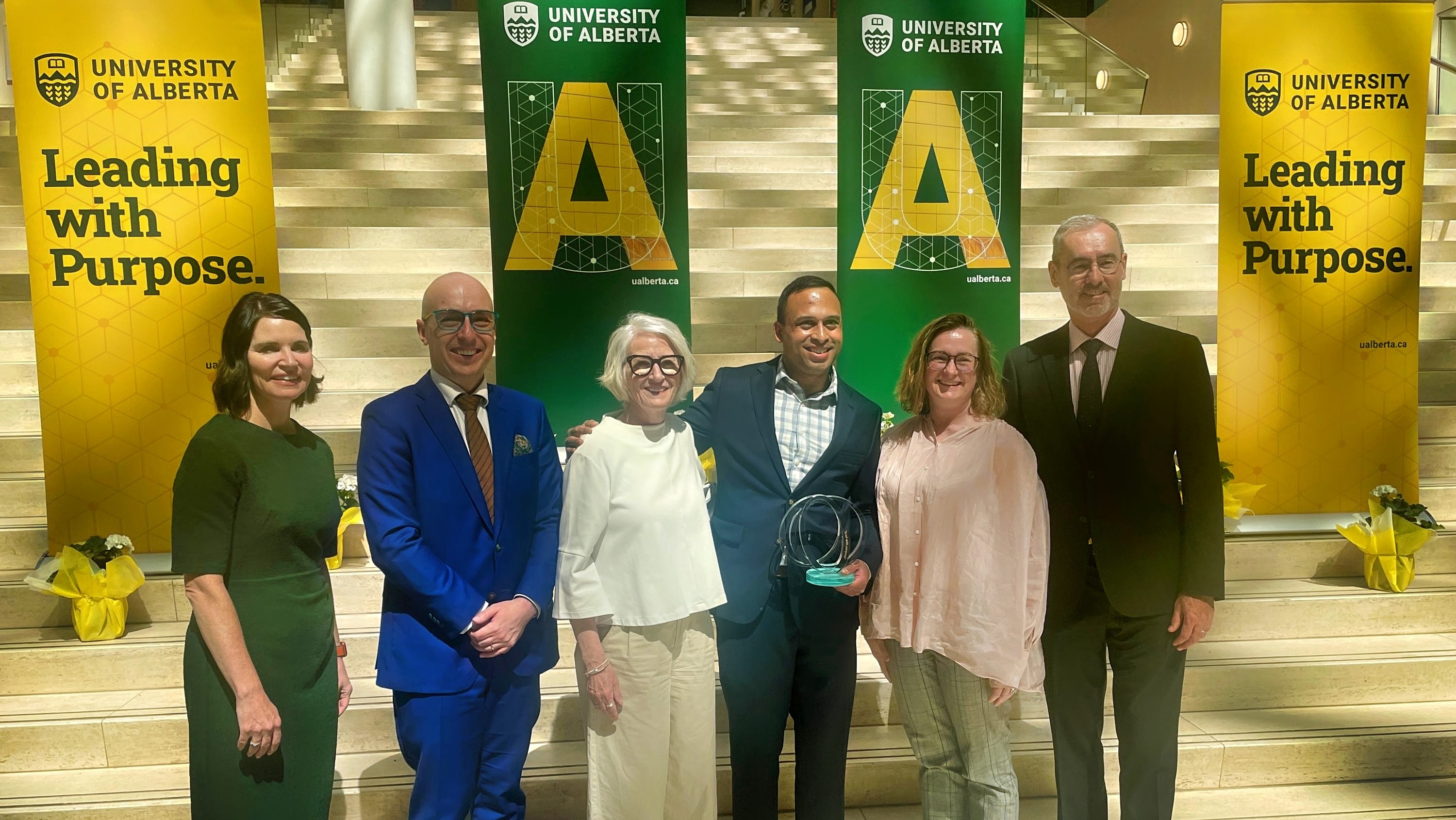Monty Ghosh — winner of this year’s University of Alberta Community Leader Award — learned a valuable lesson about resiliency when he was just 12 years old.
His father, a newcomer to Canada, faced a kidney transplant and chemotherapy, which meant he couldn’t work at his two restaurant jobs for a year and a half. Suddenly Ghosh’s mother, an accounting student, found herself responsible for paying rent, buying food and taking care of her son all on her own.
But she soon found out that she wasn’t alone at all: Friends, neighbours and relatives in Calgary’s South Asian community offered to help with food, child care and other support so she could juggle work and her studies while her husband attended medical appointments.
“We had aunties and uncles (some blood relatives and some not) who were always there to support us and take care of me, because that’s what the community did,” Ghosh recalls.
Looking back on it, Ghosh believes that crucial community support allowed the family to adapt to their tough circumstances and avoid sinking into poverty. “Having that understanding is what really shaped me,” he says.
Now, he taps into that lesson every day as he develops collaborations, policy, programs and research for vulnerable people who live with addictions.
“Many people get exposed to adverse experiences and trauma while growing up, but only a certain segment of the population actually gets impacted by it — and that is because of resiliency,” he says. “One of the best ways to build resiliency is through community support, having a loving environment with individuals around you that are there to be with you and carry you.”
Ghosh, an assistant professor of medicine, helped establish Calgary’s Rapid Access Addiction Medicine program, Alberta’s largest and first comprehensive outpatient addiction treatment program, soon to be duplicated across the province. He worked with marginalized communities to launch a nationwide overdose prevention hotline, which also led to the development of a provincewide app-based version. He helped establish peer recovery coaches and system navigators at the clinic and is now working to implement a respite program for houseless individuals so they can recover after a hospital stay and connect with social services.
“It can’t just be you creating things off the top of your head,” says Ghosh, who also works at the University of Alberta Hospital in Edmonton and the Foothills Medical Centre and is a clinical assistant professor at the U of C’s Cumming School of Medicine.
“You have to work with community partners and stakeholders including funders, not-for-profits and most importantly, people with lived experience to launch these services,” he says. “That’s the gist of community connection.”
“It’s all community, community, community!”
The Community Connections Awards recognize individuals and teams of community members, faculty, staff, students or post-doctoral fellows who embody the spirit of the U of A's promise of “uplifting the whole people.” The awards honour the positive impact of nominees on communities near and far as well as within the university.
“I’m truly humbled,” says Ghosh. “I hope it creates good exposure for the work and encourages others to venture down this path.”
Ghosh, who studied at the U of A, the University of Calgary, Harvard and Vrije University in Belgium, originally intended to work in global health, but when his father faced another round of chemo in 2016, Ghosh moved back to Alberta to help his family. A mentor, palliative care specialist Martin Labrie, pointed Ghosh toward sharing his clinical expertise outside of the hospital setting.
“Martin instilled in me that 98 per cent of a person’s care happens in the community, outside of an acute care hospital, so if you really want to make impacts on someone's health, that's where you need to shift your focus,” Ghosh recalls.
Ghosh now relies on support within the U of A community to support his research, crediting cardiologist Justin Ezekowitz, gastroenterologist Puneeta Tandon, assistant dean of medicine Vijay Daniels and new mentors such as associate professor of medicine Jennifer Ringrose in particular. He also credits Alberta Health Services mentors such as psychiatrist Michael Trew for supporting him in his career development.
“I’m still early in my career, and these are people who are already established who have been able to guide and mentor and shape me,” Ghosh says. “Again, it comes down to that sense of community that the faculty has built to support me to be the best I can be.”
In turn, he passes that on to students and other specialists who may not have thought of working in community care.
“I've benefited so much from mentorship and people helping me out that it's nice to expose students to what I see and what I do and inspire others, because it's not a sexy sector to work in,” he says. “People don't necessarily want to go to work in shelters. So, how do we change that mindset?”
He does it by showing how rewarding it can be to work in both acute and community settings at once and by sharing his enthusiasm for the work wherever he can. Ghosh served as president of the addiction medicine section of the Alberta Medical Association from 2021 to 2023 and is also co-chair of the Canadian Network for the Health and Housing of People Experiencing Homelessness.
And while Ghosh is passionate about his work, he acknowledges it is not always easy. When he hits an obstacle or feels overwhelmed, he turns to the community of physicians, academics, non-profit workers and people with lived experience who help deliver his programs.
“They provide just as much support to me for my own mental health and my own wellness, as I try to give to them. That's been paramount,” he says.
“Yeah, for me, it's all community, community, community!”
